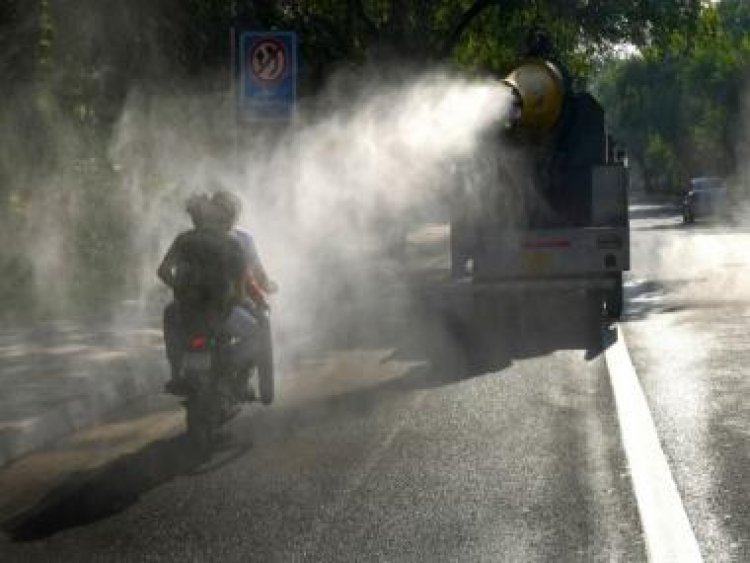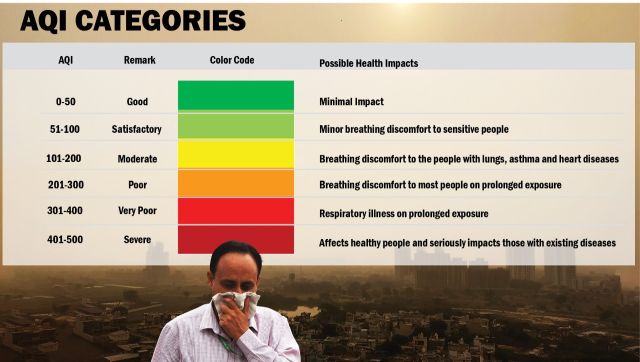AQI, PM10, GRAP: Decoding what these terms mean and how they are crucial to fight Delhi’s air pollution
AQI, PM10, GRAP: Decoding what these terms mean and how they are crucial to fight Delhi’s air pollution

Diwali is just around the corner and the Delhi-NCR is beginning to gasp for fresh, clean air. On Friday morning, the air quality in the national capital was in the ‘poor’ category as the Air Quality Index (AQI) touched 249, according to the System of Air Quality and Weather Forecasting and Research (SAFAR).
#WATCH | Smog envelops Delhi-NCR as pollution worsens amid the approaching winter season. Visuals from Ghaziabad, Uttar Pradesh pic.twitter.com/5phoYQsCPU
— ANI (@ANI) October 20, 2022
And it seems that there’s going to be no respite for Delhiites as the Commission for Air Quality Management (CAQM) has predicted a deterioration in the air quality. The CAQM has in an order said that the AQI will mostly move into the ‘very poor’ category from 22 October. It further added that as Diwali approaches, the situation will only worsen, owing to which “actions as envisaged under Stage II of GRAP will be implemented in earnest with immediate effect in the NCR in addition to all actions under Stage I”.
AQI, GRAP, PM10… What are all these terms? How do they help in trying to check air pollution?
What is AQI?
Very simply put, AQI or Air Quality Index, is a number used to communicate to the public how polluted the air currently is or how polluted it is expected to get.
Most countries have their own colour-coded Air Quality Indices corresponding to different national air quality standards. For instance, the United States uses a 500 point scale, wherein rating between 0 and 50 is considered good. Rating between 301 to 500 range is deemed hazardous.
In India, the National Air Quality Index Standard (NAQI) was launched by the Ministry for Environment, Forests & Climate Change in the year 2014 as part of the Narendra Modi government’s mission to introduce the “culture of cleanliness”.
The AQI is broken down into six categories with the associated health impacts. An AQI between 0-50 is good and has minimal impact on one’s health. Next comes the 51-100 category, deemed satisfactory, and can cause minor breathing discomfort to sensitive people.

An AQI of 101-200 is moderate and comes with breathing discomfort to people with lungs, asthma and heart diseases. The poor category has an AQI between 201 and 300 and that can cause breathing discomfort to most people on prolonged exposure.
The last two categories as ‘very poor’ with an AQI between 301-400, causing respiratory illness on prolonged exposure and the ‘severe’ category (401-500) affecting healthy people and seriously impacting those with existing diseases.
How is AQI calculated?
The index is centred around five pollutants — Particulate Matter with a diameter less than 10 micrometres (PM10) and 2.5 micrometers (PM2.5), sulphur dioxide, ground-level ozone (O3), Nitrogen Dioxide (NO2), and Carbon Monoxide (CO).
Also read: How air pollution is cutting life by 10 years in Delhi
According to the Environmental Protection Agency (EPA), PM10 are inhalable particles, with diameters that are generally 10 micrometres and smaller. Those particles are things like organic dust, airborne bacteria, construction dust, and coal particles from power plants.
Why is AQI important?
Awareness of daily levels of air pollution is important, especially for those suffering from illnesses caused by exposure to air pollution. It also helps authorities to determine what precautions and steps to take to prevent the situation from deteriorating further.

What is Delhi doing to improve its air?
As the AQI dipped on Friday and expected to fall further over the weekend, the CAQM directed authorities to enact stage two of the Graded Response Action Plan (GRAP), which includes banning the use of coal and firewood in hotels, restaurants and open eateries.
For those who are unaware, GRAP is a set of emergency measures to be taken to prevent the deterioration of air quality after it reaches a certain threshold.
It has four stages wherein Stage 1 of GRAP is activated when the AQI is in the ‘poor’ category (201 to 300), while the second, third and fourth stages are activated three days ahead of the AQI reaching the ‘very poor’ category (301 to 400), ‘severe’ category (401 to 450) and ‘severe +’ category (above 450) respectively.
Under Stage 4 of GRAP, a ban on four-wheelers is imposed in Delhi and NCR districts bordering Delhi, except for BS-VI vehicles and those plying for emergency or essential services. If the air reaches the severe+ category, under GRAP, state governments could consider additional emergency measures like the closure of schools, plying of vehicles on an odd-even basis, and decide on allowing public, municipal and private offices to work on 50 per cent strength and the rest to work from home.
As part of measures to improve the AQI, Delhi has stopped the use of diesel generators except for essential services related to national security, defence-related activities, projects of national importance, telecommunication, data services, medical, railway and metro rail services, airports, inter-state bus terminals, sewage treatment plants and water pumping stations.
Also, Delhi will undertake vacuum-based sweeping of roads every day, sprinkling of water to prevent dust pollution and strict enforcement of dust control measures at construction and demolition sites to improve the air and enable easy breathing.
Also read: Explained: What are green crackers and why should we use them this Diwali?
Delhiites have also been advised to use public transport and minimise the use of personal vehicles. Dust generating construction activities should be avoided and air filters should be replaced regularly.
The Delhi government has also banned the production, storage, sale, and bursting of crackers this Diwali and with fines, even included a jail term against violators. The Supreme Court on Thursday, declined an urgent hearing on the plea against the blanket ban on firecrackers in Delhi until 1 January 2023. “Let people breathe clean air... spend your money on sweets,” the court said while declining the plea of BJP MP Manoj Tiwari.
With inputs from agencies
Read all the Latest News, Trending News, Cricket News, Bollywood News,
India News and Entertainment News here. Follow us on Facebook, Twitter and Instagram.
What's Your Reaction?

























































